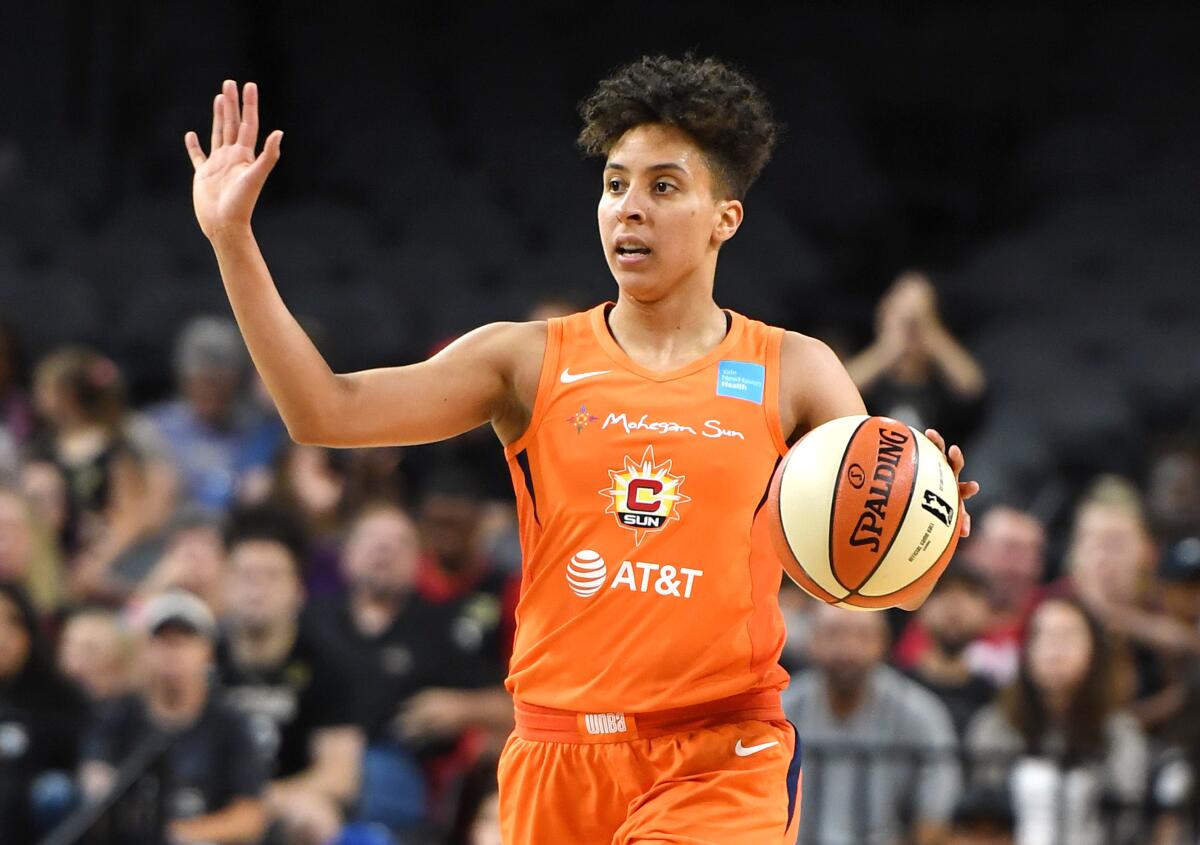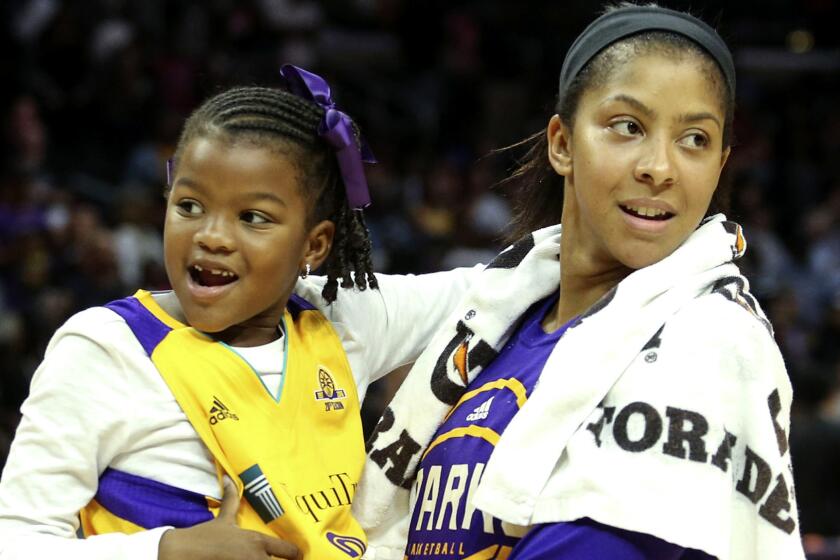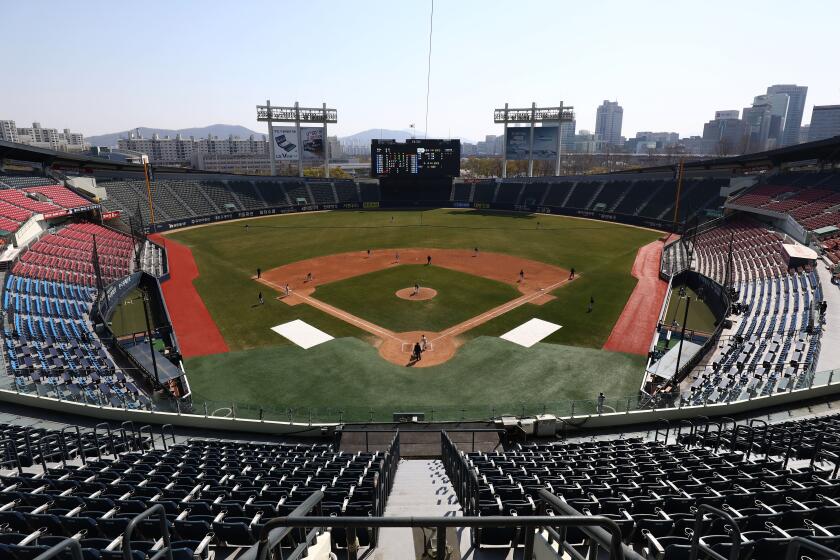WNBA continues to make progress in a crowded sports landscape

- Share via
Cathy Engelbert put the weight of the WNBA on a sweater drying rack.
The league’s commissioner, forced to introduce first-round draft picks from her home in New Jersey during the league’s virtual draft on April 17, hung jerseys carefully for easy access after announcing each selection. She recruited her two kids for assistance, because while the coronavirus pandemic has halted most of the sports world, Engelbert could not let this show stop.
The WNBA, four months removed from a ground-breaking collective bargaining agreement, is trying to maintain its momentum during a pandemic that already postponed a highly anticipated season that will feature the professional debut of No. 1 draft pick Sabrina Ionescu. For a league always trying to carve out space in a crowded sports landscape, the global health crisis will test the WNBA’s innovation yet again.
The draft provided a positive glimpse at things to come. The WNBA had its highest-viewed draft show in 16 years, its second-most-watched draft broadcast ever.
“The league is showing that we’re not looking to slow down any time soon,” said New York Liberty guard Layshia Clarendon, who will team with Ionescu this season.
Engelbert, the league’s first-year commissioner, set out three goals in growing the WNBA: to be a player-first league; to be economically stable across all levels; and to improve fan engagement and marketing. She oversaw negotiations for a CBA that increased average player salary to six figures and granted new travel and family-planning benefits. She launched the WNBA Changemakers program to increase sponsorship. Now with fans unable to watch their favorite players in action, Engelbert is starting to reimagine fan engagement beyond courtside high fives.
The WNBA’s new collective bargaining agreement includes noted improvements for players who will receive benefits while pregnant and those with families.
It might be recreating an in-arena experience for fans at home. Maybe fans, through a button on their smartphones, will be able to access live arena noise. They might be able to use live analytics on their phone to predict the game’s outcome.
“It’ll come down to data,” Engelbert said in a conference call before the draft. “It’ll come down to exposure, it’ll come down to being known on different platforms.”
Players and teams have already started the process by staying engaged on social media. The Sparks have rallied personnel from all parts of their organization to contribute social media content. San Dixon, the Jr. Sparks Clinic director, shares simple drills for #MyGrindMonday. Jamal Lovell, the team’s player development coach, breaks down film for #TeachMeTuesdays. Head trainer Courtney Watson leads #FitnessFriday workouts with simple at-home exercises.
“Everybody right now is truly chipping in to be like, ‘OK, how do we continue to tell stories, how do we continue to help people,’” Sparks President and Chief Executive Danita Johnson said, “and it’s been absolutely phenomenal.”
Without games, players introduce fans to new sides of themselves. Clarendon, an avid home cook, has discussed a possible social media cooking show with Sparks forward and fellow chef Nneka Ogwumike.
Chicago Sky guard Allie Quigley advanced to the semifinal of ESPN’s HORSE challenge, and used her Pete Maravich-inspired seated bank shot to launch the #QuarantineQuigleyChallenge on Twitter. Fans submitted their own versions of a seated shot to win a signed jersey and a personalized photo. Fans sank hook shots from moving minivans and heaved backward attempts from the top of the key. The winning shot came from the top of a roof.
“It’s so important for us to just not go ghost all of the sudden,” Clarendon said. “This horrible thing is happening in the world that we need to keep in perspective, but also making sure we’re still building that brand and building the business.”
A look at how sports leagues, including the NFL, MLB, MLS, NBA and NHL, are responding to the coronavirus outbreak.
The WNBA suspended its training camps, which were to open Sunday, and its season, which was scheduled to start May 15. But with the 2020 Olympics postponed, there is schedule flexibility for the league to return since it had planned to take a monthlong Olympic break. Having any semblance of a season is still the goal, Engelbert said.
It could get messy for the five teams — L.A., Indiana, Minnesota, New York and Phoenix — that share arenas with NBA teams. Conversations are ongoing about possible overlap at Staples Center, Johnson said.
Lining up possibilities is like solving a “Rubik’s Cube,” Engelbert said. No scenario is off the table, including quarantining teams and essential personnel in one, neutral location, or playing without fans in home arenas.
With 12 teams and 144 players, the WNBA could serve as a blueprint for a return to live sports, Clarendon said. The relatively small size of the league could make it easier to mobilize to the point of return.
Confronted with the possibility of having to share the sports spotlight this summer if the NBA season resumes during the WNBA’s regular window, the women of the league are undeterred. The WNBA — the longest-running women’s professional sports league in the country — didn’t come this far to let a pandemic knock it off track.
“Can we push on? Absolutely,” Johnson said. “That’s the fearlessness, that’s the relentless dedication to making this game work. … What’s happening is not going to stop us and we’re going to be able to fight through this.”
More to Read
Go beyond the scoreboard
Get the latest on L.A.'s teams in the daily Sports Report newsletter.
You may occasionally receive promotional content from the Los Angeles Times.













